LGBTQ and faith communities struggle for unity in Dearborn, Hamtramck
The protest began with a prayer.
On a Sunday afternoon last month in Dearborn, Nagi Almudhegi took the stage to address the crowd gathered outside Henry Ford Centennial Library to demonstrate against some LGBTQ books in Dearborn Public Schools' libraries.
"I'd like to start off first of all with a prayer," Almudhegi said. "And I'm going to read, recite the chapter on Fatiha (opening of Quran) in Arabic and then I will read the English translation."
As he spoke, some in the crowd held up signs denouncing books and educational materials in the public schools that they believe are too explicit for children. "Stop brainwash our children," read the sign of a woman cloaked in a robe. "Quit grooming students, you sexually perverted animals," read another placard held up by Wadeea Yassir, a Dearborn resident who was one of hundreds at the Sept. 25 rally, mostly Muslim. One woman with a headscarf held up a poster with a red X over a Pride flag that said: "Keep your twisted mindset to yourself." Some hurled anti-gay slurs at a counter-protester who is trans, Sam Smalley, and told him: "Go cry."
"I seek refuge in God Almighty, from Satan, the cursed one, in the name of God, the Most Compassionate, the Most Merciful," Almudhegi said. "Guide us to the straight path, the path of those whom You have blessed, and not those whom You are angered with, nor those whom are astray. Amen."
The scene on Sept. 25 reflected how religion is shaping intense debates taking place in Dearborn, Hamtramck and other cities this year over LGBTQ community and education. Another protest is planned for Monday in Dearborn as the Dearborn Public Schools board meets. Meanwhile in Hamtramck, there's concern about anti-gay graffiti that appeared last month outside City Hall, and opposition among some elected officials and faith leaders to the flying of a LGBTQ Pride flag raised this summer on Joseph Campau Avenue. But while there may now be a more visible opposition to LGBTQ people, there is also strong support for them from others in the cities, with some Muslims calling for tolerance, noting they themselves have been marginalized over the years. Dearborn and Hamtramck both have a large population of Arab American Muslims and elected last year their first Muslim mayors.
"There is no issue with having LGBTQ+ people residing in Dearborn," said Aya Moughni, a junior of Arab descent at Dearborn High School who is Muslim and opposes banning books. "If anything, I am glad that we have them here. Some people in our city seem to forget where we are from and live in. Outside of our sect, we are not welcomed in many places elsewhere in the country. As Arabs and Muslims, we are the minority in America, just as LGBTQ+ people are. ... I respectfully believe that it is very hypocritical for Arabs and Muslims to be judging people that have contrary beliefs to them. ... We are not a favored race or religion in the country. Instead of creating breaks in our city, we should be joining forces for inclusion of everyone no matter who they are."
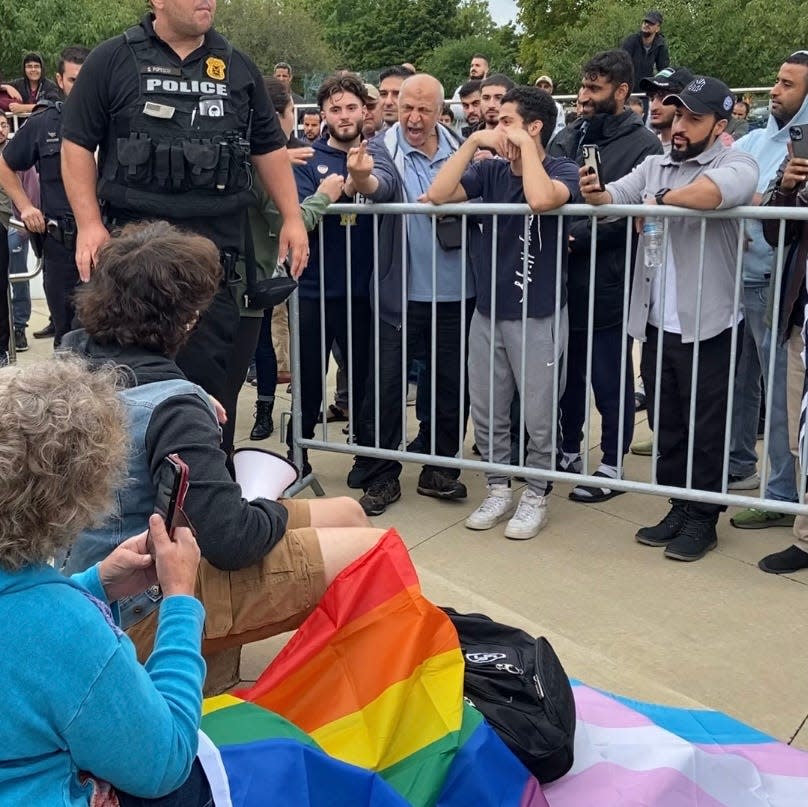
In both cities, conservative Christians were the group who initially raised fears of LGBTQ people or books, influencing some in the city's Muslim population to then take up their ideas and push for changes in their cities. About a decade ago, some of them often attacked Dearborn and Hamtramck, alleging they were filled with terrorist sympathizers and extremists who wanted to install sharia, Islamic law. Some even traveled to Dearborn to hold anti-Islam rallies: Ten years ago at an Arab-American festival in Dearborn, a group of evangelical Christians carried a pig's head on a pole and derogatory posters against Islam. And in Hamtramck, conservative Christians initiated a drive in 2008 to mobilize the Muslim community against a proposed city law protecting LGBTQ residents.
But now, conservative Christians are mobilizing among the same Muslims that some of them used to disparage.
"The same dangerous ideology that once considered people like me 'a problem' in Dearborn is now being revived under the guise of preserving liberty," Dearborn Mayor Abdullah Hammoud, the first Muslim to be Dearborn's mayor, said in a statement posted a couple of days after the protest.
During his talk, Almudhegi, who is Muslim, praised Stephanie Butler, a Dearborn parent who is Christian and helping lead the efforts in Dearborn to remove some books and other materials from Dearborn schools. So far, six books, a majority of them on LGBTQ themes, have been removed and access to the library's online system has been restricted for students.
Almudhegi said supporters of the books "call us religious extremists," but they "have to have some mental derangement ... to support this kind of stuff."
He led the crowd in chants of "Hell no!" and then praised Butler.
"Right now, Dearborn is in the middle of a great awakening," Almudhegi said, using religious references. "And it's long overdue and it's about time. A month ago, we had one Stephanie Butler. Today, mashallah (God willed), I see there are hundreds of Stephanie Butlers. And tomorrow, inshallah (God willing), we will have thousands. We're not going to be silenced anymore. We're not going to be intimidated. And together united we will make a difference."
Butler referenced the holy books of Christianity and Islam in her speech at the rally, saying schools are "pushing this pornography on our children."
"These people want to sexualize our kids," she alleged. "We can't have Bibles. We can't have Qurans. But we can have smut."
The crowd often applauded as Butler spoke, cheering as she attacked public schools for their educational materials and led them in cries of "Enough is enough."
"God is watching out," Butler said. "God is here to protect us. I can say now my heart is full seeing the community come together in the name of protecting our children."
After the rally, some conservatives in Michigan praised the event as an example of Muslims and Christians working together. The co-chair of Michigan's Republican Party, Meshawn Maddock, posted photos of the Dearborn rally in a tweet that read in part: "Democrats have a BIG problem. Over 800 Muslim and Christian parents showed up to protest the sexualization of their kids in Dearborn Public Schools!"
Politics may also be playing a role. Maddock and some other conservatives say the protesters will be voting Republican in November. In her tweet, Maddock wrote: "Guess what they said when asked 'how will you vote?' Republican!"
A couple of hours before the rally Almudhegi spoke at, there was another rally in the same location in support of the books that Moughni spoke it.
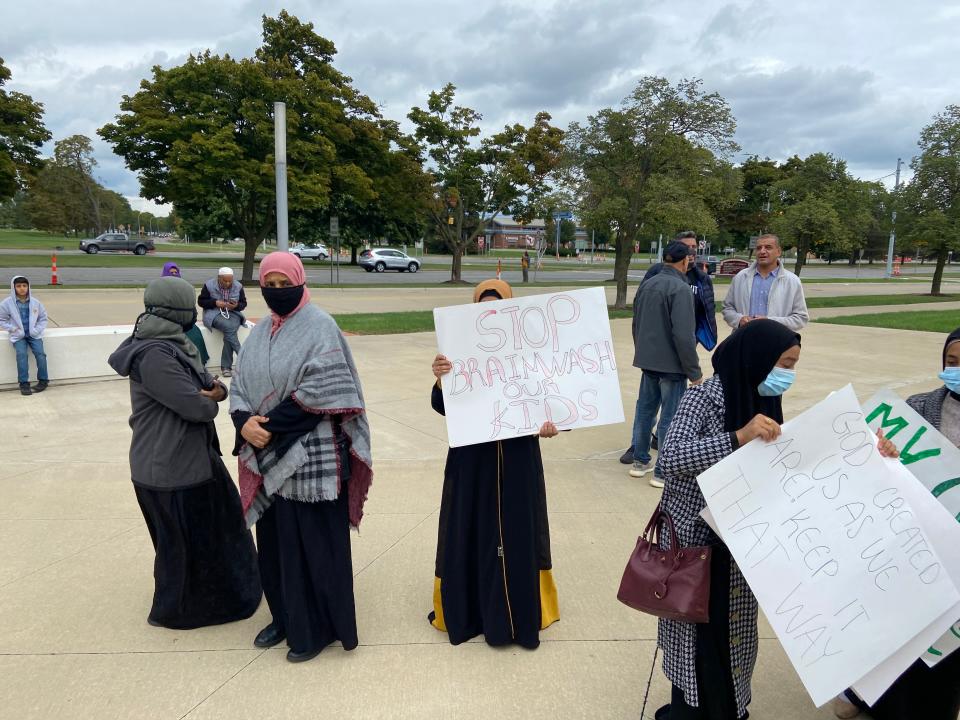
Paul Bruce, a retired school teacher in Dearborn Public Schools who is gay, also spoke at that earlier rally. He used to teach in Salina Intermediate, a school in the south end of Dearborn where the vast majority of students were Arab-American Muslims, many of them of Yemeni descent. Growing up, Bruce remembers facing homophobic bullying when he attended Dearborn public schools in the 1970s and hostility from some officials when he started teaching. He said he wishes there had been LGBTQ books when he was growing up that could have helped him. Despite his challenges, he's had a positive experience with the students he taught.
"I can't tell you enough good things about the community and the kids that are there," Bruce said of his time teaching Muslim students in Dearborn schools. "So when I see members of the Muslim or Arab American community being" manipulated by "a hate group that literally worked against them during Trump's time in office ... it's just very, very sad to watch that happening and realize that nobody is aware of that."
"These are the same people that were all for a Muslim ban," Bruce said. "Do you even know how unholy this alliance that you've made with these people? These haters are going to turn around and call you terrorists tomorrow."
Hamtramck tensions after Pride flag raised and hate graffiti
On a Saturday in early July, Russ Gordon climbed up a ladder on Joseph Campau Avenue in Hamtramck and raised up the Pride rainbow flag that LGBTQ advocates display as a symbol.
As the chair of Hamtramck's Human Relations Commission, Gordon has for years been raising up flags on city-owned poles on the avenue of various nations that reflect the diversity of Hamtramck, which has the highest percentage of immigrants among cities in Michigan.
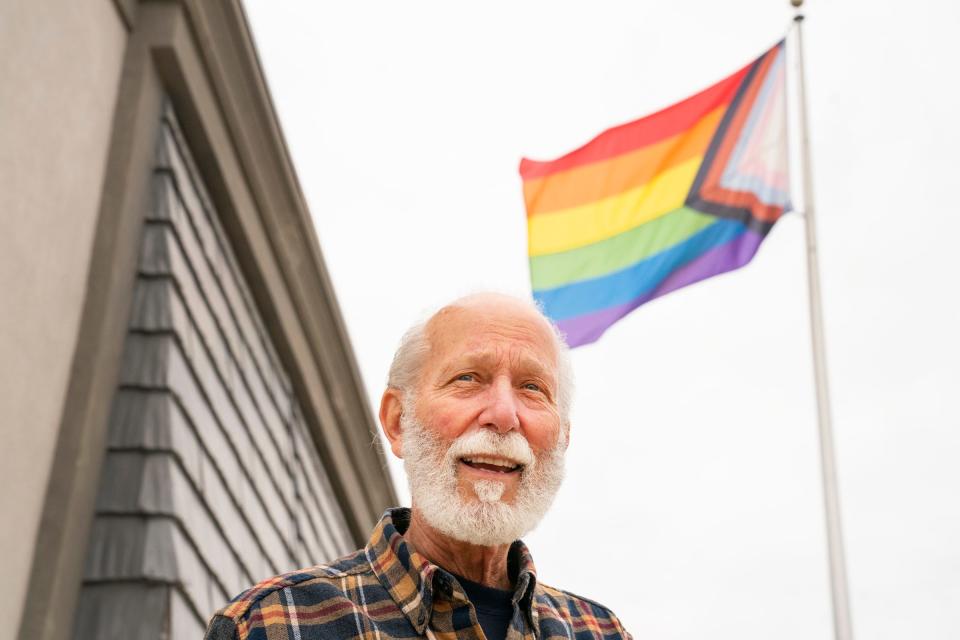
"I just want everybody to feel happy and included," Gordon said last month while standing next to the Pride flag that sits south of Davison. Further south along the street were the flags of countries such as Bangladesh, Mexico, Yemen, and Poland, among others. "Each individual flag makes me feel good. I know that there are a lot of folks that are going to see that flag and smile and feel warm inside."
But some in the city were not happy with the flag being raised on city-owned property, expressing their concerns on Facebook and at city council meetings.
Last November, voters had elected as their new mayor Amer Ghalib, whose platform included opposition to raising the Pride flag on city properties. In June last year, Hamtramck city council voted to approve a resolution — with then-mayor Karen Majewski casting the tie-breaking vote — to raise the Pride flag on a pole outside City Hall in Zussman Park.
Gordon said that he had the authority to put up the flag on Joseph Campau based on that resolution and a phone call from former city manager Kathy Angerer, who asked him to get in touch with the chair of the city's Arts & Cultural Commission to put up a flag.
Gordon said he didn't put up the flag last year because they were trying to get approval from the designer of the newer version of the Pride flag, the one with an arrow representing Black, Brown and Trans communities.
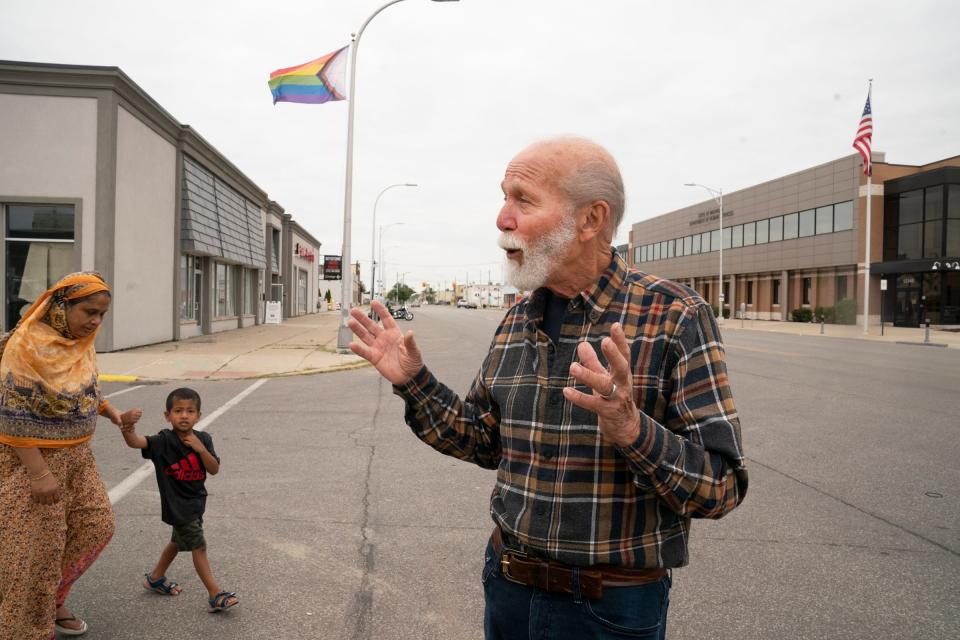
"The city manager called me and a commission had wanted it up," Gordon said. "This is the city of Hamtramck asked me to do it. This is not just one citizen."
But Ghalib and his supporters said Gordon had no authority to put up the flag since his commission didn't meet and have a quorum in more than a year. Some in the Muslim community felt raising the flag was an anti-democratic move by opponents of the mayor at odds with the views of newly elected officials. After the November election, the entire city council and mayor became Muslim: Ghalib was the first Muslim mayor of Hamtramck and the city was the first in the U.S. believed to have an all-Muslim city council. Some supporters of the mayor were upset with him for allowing the flag to be raised.
"The issue was not with the flag itself, it was with not going through proper channels and not following the rules and regulations of the responsible commission," Ghalib told the Free Press. "The last meeting for the commission was on January of 2021, and even in that meeting there was no quorum. Based on that, all the outcomes of any meeting with no quorum are invalid. Despite of that, we reacted responsibly to this issue when we found that some people are trying to create problems and divisions within our community, so we kept the flag to prevent any tension. However, some wise flag supporters admitted that it was a mistake and indirectly apologized for what happened."
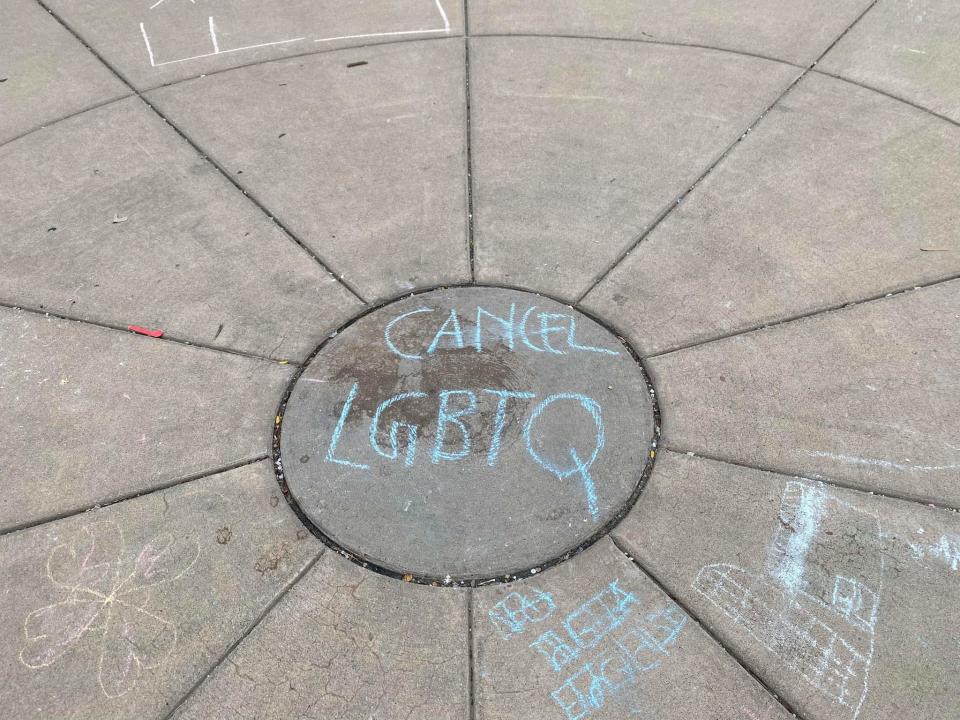
Ghalib added that he doesn't "have a problem with anything that is decided correctly by following rules and regulations of the city commissions."
Adding to the tensions was anti-gay graffiti scrawled in chalk in Zussman Park that was discovered by a police reservist on Sept. 4. Photos provided by a city official show some of the graffiti read: "Cancel LGBTQ" and "LGBTQ" with the letter X on top of it, among other anti-gay writing. The graffiti included an Instagram handle of a person who appears to have an account that includes a photo of a man holding a rifle. Officials later removed the graffiti after spotting it.
Hamtramck Police Chief Anne Moise did not say whether police are investigating the grafitti.
"I haven't had a chance to look into it," Moise told the Free Press.
LGBTQ group formed in Hamtramck
In July, a new LGBTQ group in Hamtramck was formed after the flag was raised to show support.
Hamtramck resident Josh Hansknecht said he formed the Hamtramck LGBTQ Alliance "in response to the recent, and prior flag LGBTQ debates in our city as a way to bring together the people in this city who celebrate diversity and Pride."
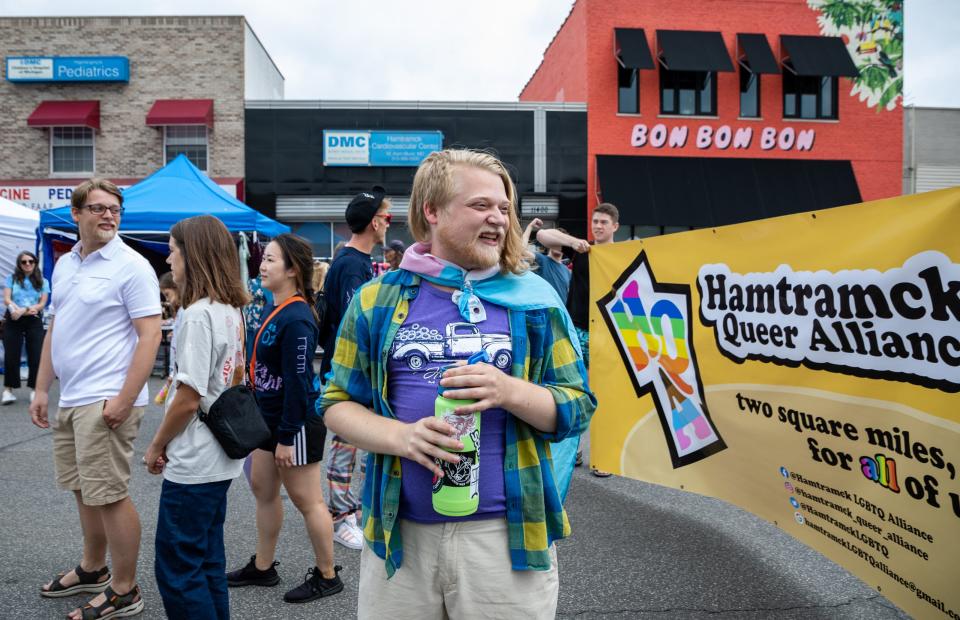
He said that "when a city puts up a pride flag, it is a symbol of safety to the community and to visitors that people are safe being themselves here. I find this to be reason enough to support having a flag up. There are many people in this city who are dedicated to making Hamtramck an inclusive and welcoming place."
The day after the graffiti was found, Hansknecht and others marched in a Queer Alliance float in the Hamtramck Labor Day Parade.
Prof. Mark Rigstad, a Hamtramck resident who teaches philosophy at Oakland University, marched along with the float in support, but was anxious after learning about the anti-gay messages found the day before.
"I scanned the rooftops as I walked up Joseph Campau, because you never know these days when a parade might become a live shooter situation, especially when it’s preceded by the kind of public hate speech expressed in the graffiti," Rigstad said.
Rigstad said that he supports the Pride flag and he hopes that the Muslim community will too, given that progressives in 2004 had supported the right of Muslims to broadcast in public the Islamic call to prayer over loudspeakers. He expressed support for both Muslims and the LGBTQ community.
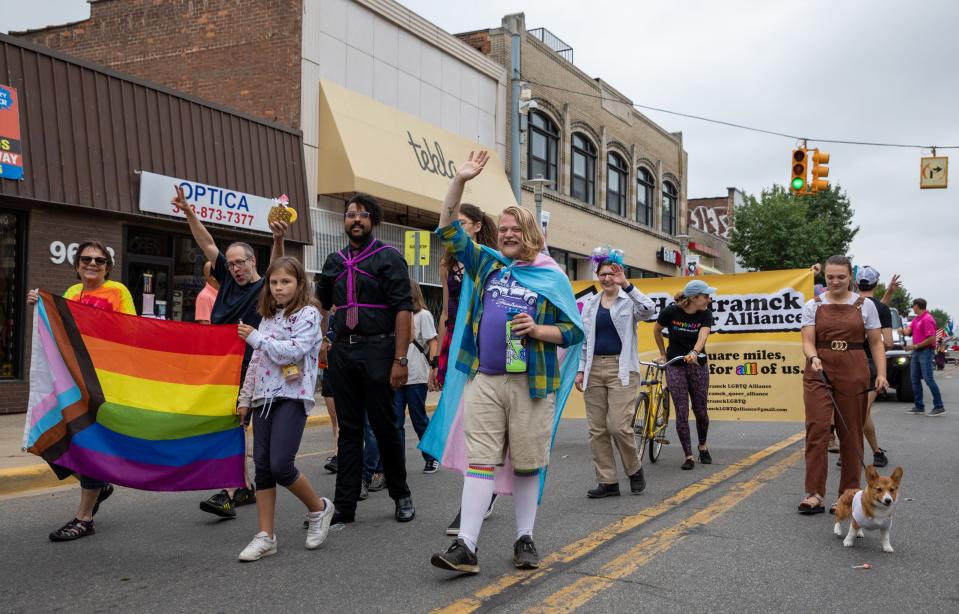
"This is a community that needs to embrace all of its members," Rigstad said. "The flag is really just like the call to prayer. It's speaking on behalf of part of the community and we want everyone to have a voice."
In 2008, conservative Christian groups led an effort to defeat a ballot proposal in Hamtramck that would have protected LGBTQ people from discrimination by city officials. They helped organize a rally in October that year with Muslim leaders where some speakers made anti-gay remarks. The ballot proposal was defeated.
Ghalib said he supports unity in Hamtramck.
"I'm honestly not aware of any anti-LGBTQ behavior in Hamtramck," Ghalib said. "If there was any, it would be an individual behavior and doesn't represent a group or an organization. Our job is to try to bring our community together and prevent any divisions and we succeeded in doing so despite the repeated unjustified and unethical attacks on the new city government."
Bill Meyer, a longtime activist in Hamtramck who is liberal, supports the mayor and LGBTQ rights, saying at a council meeting that the flag was put up without proper authorization. Meyer also said that issue of LGBGQ rights is often used by people in the West as a way to unfairly assert power and malign the Arab world and Muslims, a point made by Prof. Joseph Massad of Columbia University in his 2007 book "Desiring Arabs." In metro Detroit, there are LGBTQ Muslims who combine both worlds and have developed a unique outlook that respects both communities.
Dearborn tensions
During the rally in Dearborn, Smalley sat on the steps as a counter-protester, the LGBTQ and Trans flags laid out in front of him. Organizers dubbed it a "Rally to Protect Our Children."
Protected by several Dearborn police officers, Smalley held a bullhorn that he sometimes used to speak out or played a siren sound to drown out what he felt was hateful rhetoric. Two men gave him the middle finger as one of them hurled an anti-gay slur at him. Others at the rally expressed anti-LGBTQ views, with one man making references to Satan when talking about gay people.
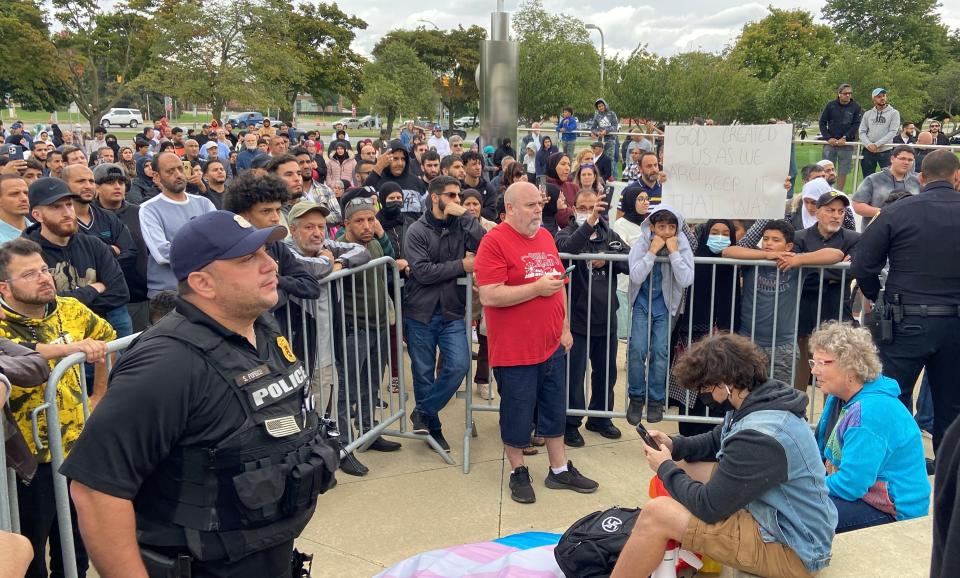
Smalley, currently a student at Michigan State University, said he wishes that books on LGBTQ were available when he was younger.
"I'm here because I grew up transgender in Dearborn," Smalley told the Free Press before the rally started. "And I faced a lot of harassment and just a lot of shame during that time because people aren't very accepting of people like that. And I feel like, even though people make this seem like it's about protecting the children, I think that everyone has a right to education and a right to see themselves, see people like themselves in books and public schools. So I'm here because I didn't get that when I was a kid. I felt completely isolated. Everyone tried to make me feel bad about myself just for who I was. So I'm here right now, not feeling bad about myself, hopefully to inspire other people."
Speakers and organizers insisted they're not bigots and are not political.
"We want to leave the politics out of this," Hassan Chami said to the crowd.
This is not "book banning, censorship, homophobic. All it is protecting our children," he said. "They're trying to say this is homophobic. There's a book that was banned. It was called 'This book is gay.' And I tell you, if the book was called, 'This book is straight,' we're still gonna go after it."
Five religious leaders in the Muslim community attended the protest. Chami thanked the "clerics and sheikhs that showed up right here, we want to thank them for coming out." He also praised a Dearborn mosque for announcing the protest at its Friday prayers.
In recent days, text messages and WhatsApp messages have added fuel to the debate, with some calling for a larger protest on Monday evening during the schools board meeting.
Brian Stone, a Dearborn resident who is part of the LGBTQ community, hopes that more will speak up to support them.
"The LGBTQ community in Dearborn doesn’t have the power or influence to stop this growing tide of hatred," Stone said. "The tsunami will either sweep our city away to a dark, new page in our history; or we will break the storm because good people stand up and say, 'Enough. No more hatred. ... They do not represent me.'"
At the conclusion of the rally, seven police officers escorted Smalley as he walked away to his vehicle. A group of young Muslim students trailed after him holding posters that read "My Child, My Choice" and "God Created Us As We Are! Keep It That Way," trying to get his attention.
"Go cry at home," one yelled at Smalley.
"Go cry," said another.
But other Dearborn youth have differing views.
Moughni said that "my religion teaches us to be kind to one another. ... Using religion as a justification to ban books is not valid, but rather creates and imposes a bad name to all religious people around the world."
"Having queer individuals in our community creates a greater sense of inclusion and diversity," she added. "Diversity is what we want and strive for."
Contact Niraj Warikoo: [email protected] or Twitter @nwarikoo
This article originally appeared on Detroit Free Press: LGBTQ, faith communities face tensions in Dearborn and Hamtramck
Solve the daily Crossword

